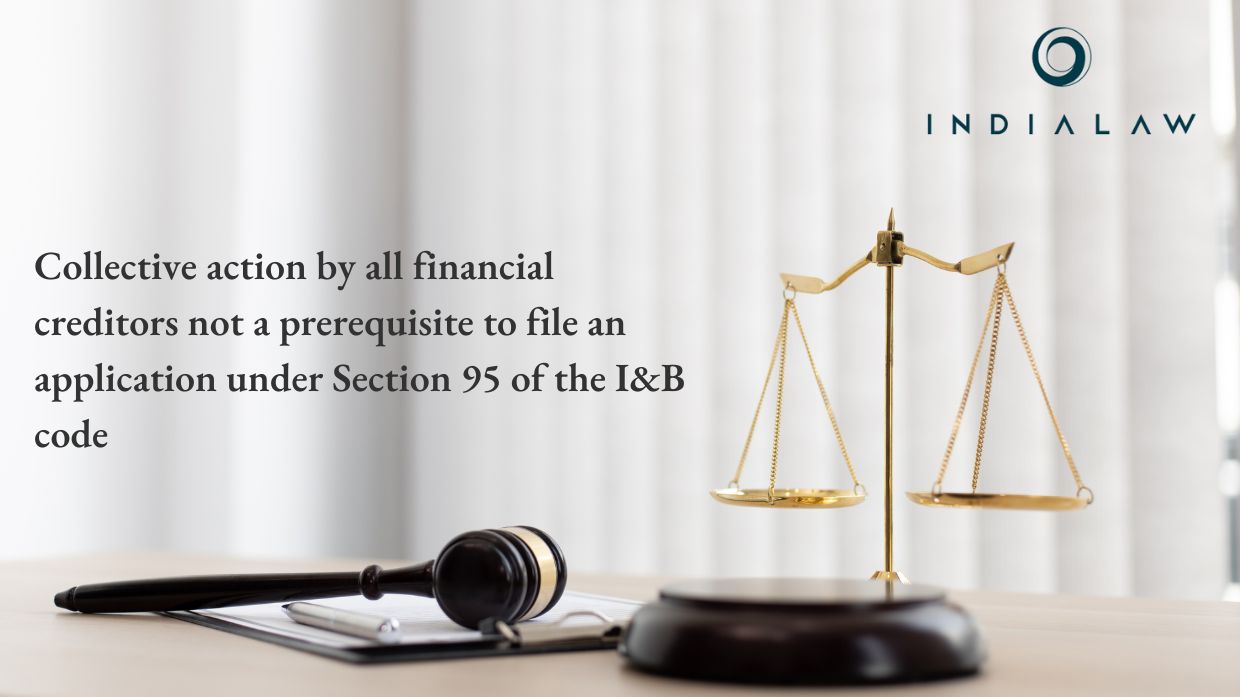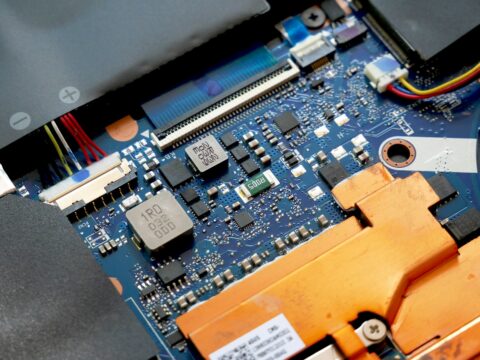Collective action by all financial creditors not a prerequisite to file an application under Section 95 of the I&B code

Dheeraj Wadhawan v. Union Bank of India & Anr.[1]
NCLAT, Principal Bench, New Delhi
Introduction and Facts of the Case
The present case, which was decided by the National Company Law Appellate Tribunal (NCLAT) on August 14, 2024, revolves around the insolvency proceedings initiated under Section 95 of the Insolvency and Bankruptcy Code, 2016 (the code). The key issue in both appeals was whether section 95 of the code, allowed a creditor to independently file an application to initiate insolvency proceedings against personal guarantors, i.e., whether Union Bank of India (UBI) in this case was required to collectively file the insolvency application with the consortium of banks, against Dheeraj Wadhawan and Kapil Wadhawan, who were the personal guarantors to Dewan Housing Finance Corporation Limited (DHFL; Corporate Debtor).
DHFL had availed various term loan facilities worth Rs. 450 crore and working capital facilities worth Rs. 450 crores. Both the appellants provided personal guarantees for these credit facilities, and a joint deed of guarantee was executed in June 2019. However, due to default in repayment by DHFL, the Reserve Bank of India (RBI), as the financial creditor, filed an insolvency petition against DHFL, which was admitted by the National Company Law Tribunal, Mumbai (NCLT) on 3rd December 2019. Subsequently, UBI invoked the joint deed of guarantee to recover the outstanding dues payment. When the appellants failed to make the payment, UBI filed an application under Section 95 of the code to initiate insolvency proceedings against the personal guarantors.
The application was admitted by the NCLT, Mumbai bench, leading the appellants to file an appeal before the NCLAT, which upheld the order passed by NCLT. Aggrieved by the same the appellants approached the Supreme Court; however, the Supreme Court reaffirmed the stance taken by NCLT and dismissed the appeal.
Following this, the appellants initiated further litigation, arguing that the application filed by UBI would not be maintainable as the same was filed individually when it should have been filed by the security trustee of all the banks collectively. Thus, the case was brought before the NCLAT to decide upon the issue.
Table of Contents
Contentions of the Parties
The appellants contended that the application filed by UBI under Section 95 of the code was not maintainable on the grounds that UBI alone could not initiate insolvency proceedings without the consent or involvement of the entire consortium of banks.
The appellants pointed to Clause 43 of the deed of guarantee and Clause 8.5 of the Security Trustee Agreements (STA), which, according to them, stipulated that enforcement action, including initiating insolvency proceedings, should be taken collectively by all the lenders or by the security trustee. They further relied on the decision of the NCLAT in the case of Rakshit Dhirajlal Doshi v. IDBI Bank Ltd. & Ors[2]. to support their argument that a financial creditor could not initiate such proceedings individually without consent from all the lenders.
On the other hand, the respondents argued that the contentions of the appellants were baseless and unfounded. They emphasized that the appellants could not raise the issue about maintainability in the present appeal since it had not been raised in the previous round of litigation, when the case had already reached the Supreme Court. They further contended that the decision of the NCLAT in the case of Rakshit Dhirajlal Doshi was not applicable to the present case, as the facts were different, and no lender had objected to the actions of UBI.
Furthermore, the respondents claimed that under Section 95 of the code, an application for initiating insolvency proceedings could be filed by a single financial creditor without the need for collective action by all the lenders. They also referred to the NCLAT’s decision in Prem Prakash Bansal v. M/s IDBI Bank Limited[3], which supported their position that individual lenders could act independently in such matters.
Decision of the NCLAT
After considering the submissions of both parties, the tribunal dismissed the appeals. It was held that the appellants could not raise the issue of maintainability of the application under Section 95 at this stage, as this contention should have been raised in the earlier round of litigation. The tribunal emphasized that objections regarding the maintainability of an application must be raised at the outset and cannot be brought up after the matter has progressed significantly.
The NCLAT also found that the clauses referred to by the appellants from the deed of guarantee and STA did not support their contention that UBI’s application was invalid. The tribunal ruled that the rights of the creditors, including UBI, to enforce the guarantee coexisted with that of the security trustee, and the deed of guarantee did not restrict enforcement action to the security trustee alone.
Moreover, the NCLAT clarified that Section 95 of the IBC allows for the initiation of insolvency proceedings by a single creditor, even in cases involving multiple creditors. The Tribunal rejected the appellants’ reliance on the Rakshit Dhirajlal Doshi case, stating that the facts of that case were distinguishable from the present case, where there was no dispute among the lenders regarding the application.
Therefore, it was held by the NCLAT that the appellants had no substantial grounds for challenging the maintainability of UBI’s application under Section 95 of the IBC. Consequently, the appeals were dismissed, and the orders of the NCLT admitting the applications were upheld.
Conclusion
The NCLAT’s decision in the case of Dheeraj Wadhawan v. Union Bank of India case emphasizes the need for timely raising objections to the maintainability of insolvency proceedings under the code. The ruling explains that a single financial creditor can commence insolvency proceedings against a personal guarantor without the necessity for collective action by all the lenders, as long as the contractual agreements do not explicitly restrict any such action.
The decision also highlights the principle that objections to the maintainability of legal actions must be raised at the earliest possible stage to ensure timely completion of the process given that the resolution process under the code is a time-bound process. The NCLAT’s rejection of the appellants’ reliance on the Rakshit Dhirajlal Doshi case further reaffirms the notion that each case must be evaluated based on its unique facts and circumstances.
Overall, this decision is helpful for financial creditors and guarantors in insolvency proceedings, emphasizing the need for clear contractual terms and prompt legal action to protect their individual rights and interests.
[1] Dheeraj Wadhawan v. Union Bank of India & Anr; Kapil Wadhawan v. Union Bank of India & Anr. [2024] Comp. App. (AT) (Ins) No. 863, 1135 (NCLAT) (14 August 2024).
[2] Rakshit Dhirajlal Doshi v. IDBI Bank Ltd. [2022] CA (AT) (Ins) No. 4524 (NCLAT) (15 November 2022)
[3] Prem Prakash Bansal v. IDBI Bank Ltd. [2022] CA (AT) (Ins) No. 1541 (NCLAT) (10 April 2024)
By entering the email address you agree to our Privacy Policy.



